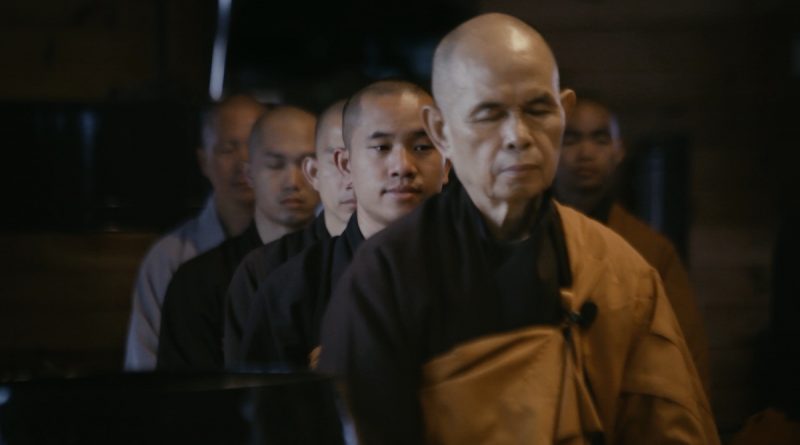Walk With Me (PG) | Close-Up Film Review

Dir. Max Pugh and Marc J. Francis, UK, 2017, 94 mins, in English, French and Vietnamese with subtitles if appropriate
Cast: Benedict Cumberbatch, Thich Nhat Hanh
Review by Carol Allen
The technique of “mindfulness” or “living in the moment”, which is based on Buddhist meditation, is becoming increasingly popular as a psychotherapy technique in the West. So this documentary about life in the monastery in rural France, which is led by Vietnamese born Zen Buddhist master Thich Nhat Hanh, couldn’t be more timely.
Max Pugh and Marc J. Francis filmed the master and his followers over a period of three years and the first part in particular is purely observational as opposed to informational, as we watch the nuns and monks in the community going about their peaceful daily lives, walking through the nearby woods, preparing and sharing their silent meals and so on, combined with poetic scenes of burning candles and the moon over the lake and the chimes of the bells calling the disciples to meditation. It is all so peaceful in fact that you might find yourself going into a meditative trance while watching. It is though enlivened by the odd touch of affectionate humour, as when one acolyte is seen yawning and fidgeting during one group meditation and by the mellifluous tones of actor Benedict Cumberbatch reading voice over from Nhat Hanh’s early journal writings.
The film becomes more informative when Nhat Hanh and his team go on a tour of America, where the master is regarded as something of a superstar guru and we get questions from interested would be followers, such as a small girl, whose dog has died, asking the master about the meaning of mourning for the dead. Also striking is the serenity of the disciples when confronted with the aggressive rantings of a street bible puncher. In this section we also get more of a sense of mindfulness in the context of everyday life, when a nun is reunited in prayer with her elderly father, whom she hasn’t seen for a long time or when the disciples take their teachings into a women’s prison.
We learn little about the life of Nhat Hanh or actual facts about the impact of his teachings on the West and if you have intellectual questions about meditation and the technique of mindfulness, this film is unlikely to answer them. It will however give you a taste of the philosophical experience and the purpose of those bells, which chime in the monastery every fifteen minutes, reminding followers to return to the here and now, rather than fretting about the past or worrying about the future. As Thich Nhat Hanh tells us, “Life and all the wonders of life are only available in the present moment.”




